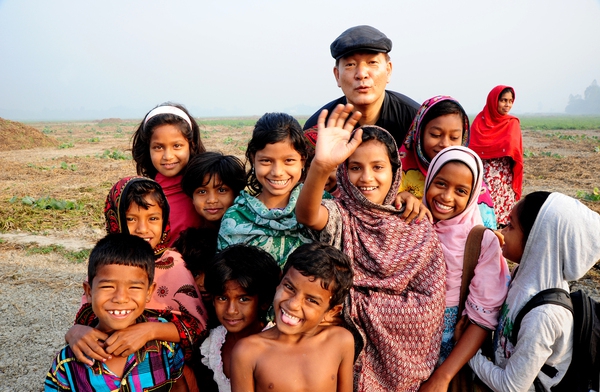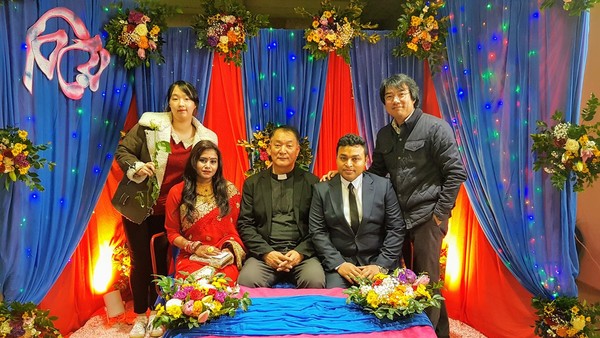 |
|
Father Lee Jeong-ho poses with a group of children at the first annual, “Young People Talking about Multiculturalism” event in Bangladesh in January of this year. (provided by Namyang Foreigner Welfare Center)
|
“I hope this will be an occasion for recognizing migrants as part of South Korean society,” says Father Lee Jeong-ho
When newly ordained Anglican minister Lee Jeong-ho, now 60, first crossed Machi Ridge in Namyangju, Gyeonggi Province, and entered the village of Maseok in June 1990, it was still a place for people with Hansen’s disease. Ostracized patients and their family members had gathered there to create their own village, where they raised pigs and chickens. At some point, more and more people from Southeast Asia began showing up. When Lee asked who they were, he was told they had “come to make money.” They were employees of a factory that had rented a chicken farm and brought in machinery to make furniture. So it was that other victims of discrimination took up residence next to victims of ostracism. Maseok Furniture Complex had around 2,000 migrant workers around the time the Asian financial crisis hit in 1998. The employment permit system had not yet been introduced; the industrial trainee system was still in effect, and most of the workers were undocumented. The state defines international residents without visas as “illegal sojourners.” In those days, it was still routine for South Korean bosses to beat migrant workers, insult them, and siphon off their wages. Father Lee’s job was to stop the violence at the complex and claim the unpaid money. The Namyangju Foreigner Welfare Center, where Lee serves as director, was also responsible for going to the Office of Immigration to have temporary custody lifted for migrant woman who had left a child alone at the complex when she was arrested in a crackdown and faced with deportation. For 27 years, Lee has been a friend, guardian, and keeper of order for migrant workers at the complex. On Dec. 8, he was recognized for his service with an Order of Civil Merit, Camellia Medal, at the 2017 Republic of Korea Human Rights Awards, held at the Seoul Central Government Complex annex on the 69th anniversary of the Universal Declaration of Human Rights. “I did it because I believe in Jesus Christ, and because I am a priest,” Lee said in a telephone interview on Dec. 12. “Jesus teaches us to help those who are weary, who have nothing, who are lacking and thwarted and suffering.” “The term ‘migrant’ does not appear anywhere in the Moon Jae-in administration’s 100 chief governance tasks,” he added. “I hope this will be an occasion for recognizing migrants as part of South Korean society and giving courage to migrant workers in Maseok and other places.” Thousands of people have visited the Namyang Foreigner Welfare Center over the years to have a cup of coffee and talk about solutions for the difficulty of their work or the sad plights of ailing coworkers. Roger, who worked at the complex for 24 years without a visa before returning home in 2015 to the island of Mindoro in the Philippines, worked with the center in ministering to the local Filipino community. Mahiya, a “girl without a country” born to undocumented migrant worker parents at an OB/GYN clinic in Seoul’s Mangu neighborhood, was one of the children entrusted to the center’s day care facility. Obtaining citizenship was never an option for Mahiya, who in 2013 left for her parents’ home country of Bangladesh.
 |
|
Father Lee Jeong-ho (center) attends a wedding of migrant workers from Bangladesh at a restaurant in the Maseok Furniture Complex in Namyangju, Gyeonggi Province on Nov. 19. (provided by Namyang Foreigner Welfare Center)
|







